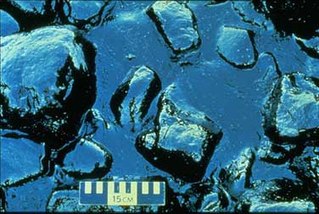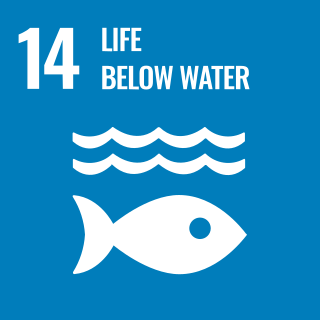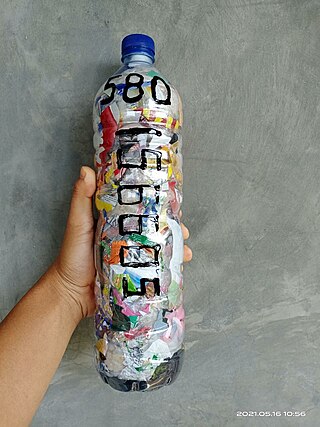
Plastic recycling is the processing of plastic waste into other products. Recycling can reduce dependence on landfill, conserve resources and protect the environment from plastic pollution and greenhouse gas emissions. Recycling rates lag behind those of other recoverable materials, such as aluminium, glass and paper. From the start of plastic production through to 2015, the world produced around 6.3 billion tonnes of plastic waste, only 9% of which has been recycled and only ~1% has been recycled more than once. Of the remaining waste, 12% was incinerated and 79% was either sent to landfills or lost to the environment as pollution.

Marine plastic pollution is a type of marine pollution by plastics, ranging in size from large original material such as bottles and bags, down to microplastics formed from the fragmentation of plastic material. Marine debris is mainly discarded human rubbish which floats on, or is suspended in the ocean. Eighty percent of marine debris is plastic. Microplastics and nanoplastics result from the breakdown or photodegradation of plastic waste in surface waters, rivers or oceans. Recently, scientists have uncovered nanoplastics in heavy snow, more specifically about 3,000 tons that cover Switzerland yearly.

As with many countries, pollution in the United States is a concern for environmental organizations, government agencies, and individuals.

The International Bamboo and Rattan Organization (INBAR) is an independent intergovernmental organization established in 1997 to develop and promote innovative solutions to poverty and environmental sustainability using bamboo and rattan.
The environmental impact of agriculture is the effect that different farming practices have on the ecosystems around them, and how those effects can be traced back to those practices. The environmental impact of agriculture varies widely based on practices employed by farmers and by the scale of practice. Farming communities that try to reduce environmental impacts through modifying their practices will adopt sustainable agriculture practices. The negative impact of agriculture is an old issue that remains a concern even as experts design innovative means to reduce destruction and enhance eco-efficiency. Animal agriculture practices tend to be more environmentally destructive than agricultural practices focused on fruits, vegetables and other biomass. The emissions of ammonia from cattle waste continue to raise concerns over environmental pollution.

Plastics are a wide range of synthetic or semi-synthetic materials that use polymers as a main ingredient. Their plasticity makes it possible for plastics to be molded, extruded or pressed into solid objects of various shapes. This adaptability, plus a wide range of other properties, such as being lightweight, durable, flexible, and inexpensive to produce, has led to their widespread use. Plastics typically are made through human industrial systems. Most modern plastics are derived from fossil fuel-based chemicals like natural gas or petroleum; however, recent industrial methods use variants made from renewable materials, such as corn or cotton derivatives.
Recycling can be carried out on various raw materials. Recycling is an important part of creating more sustainable economies, reducing the cost and environmental impact of raw materials. Not all materials are easily recycled, and processing recyclable into the correct waste stream requires considerable energy. Some particular manufactured goods are not easily separated, unless specially process therefore have unique product-based recycling processes.
A plastic bag ban or charge is a law that restricts the use of lightweight plastic bags at retail establishments. In the early 21st century, there has been a global trend towards the phase-out of lightweight plastic bags. Single-use plastic shopping bags, commonly made from low-density polyethylene (LDPE) plastic, have traditionally been given for free to customers by stores when purchasing goods: the bags have long been considered a convenient, cheap, and hygienic way of transporting items. Problems associated with plastic bags include use of non-renewable resources, difficulties during disposal, and environmental impacts. Concurrently with the reduction in lightweight plastic bags, shops have introduced reusable shopping bags.

Plastic pollution is the accumulation of plastic objects and particles in the Earth's environment that adversely affects humans, wildlife and their habitat. Plastics that act as pollutants are categorized by size into micro-, meso-, or macro debris. Plastics are inexpensive and durable, making them very adaptable for different uses; as a result, manufacturers choose to use plastic over other materials. However, the chemical structure of most plastics renders them resistant to many natural processes of degradation and as a result they are slow to degrade. Together, these two factors allow large volumes of plastic to enter the environment as mismanaged waste which persists in the ecosystem and travels throughout food webs.
There are various issues of waste management in Thailand, including excessive plastic use, industrial waste, among others.
China's waste import ban, instated at the end of 2017, prevented foreign inflows of waste products. Starting in early 2018, the government of China, under Operation National Sword, banned the import of several types of waste, including plastics with a contamination level of above 0.05 percent. The ban has greatly affected recycling industries worldwide, as China had been the world's largest importer of waste plastics and processed hard-to-recycle plastics for other countries, especially in the West.

The 2022 United Nations Climate Change Conference or Conference of the Parties of the UNFCCC, more commonly referred to as COP27, was the 27th United Nations Climate Change conference, held from 6 November until 20 November 2022 in Sharm El Sheikh, Egypt. It took place under the presidency of Egyptian Minister of Foreign Affairs Sameh Shoukry, with more than 92 heads of state and an estimated 35,000 representatives, or delegates, of 190 countries attending. It was the fifth climate summit held in Africa, and the first since 2016.

Sustainable Development Goal 14 is about "Life below water" and is one of the 17 Sustainable Development Goals established by the United Nations in 2015. The official wording is to "Conserve and sustainably use the oceans, seas and marine resources for sustainable development". The Goal has ten targets to be achieved by 2030. Progress towards each target is being measured with one indicator each.

Plastic sequestration is a means of plastic waste management that secures used plastic out of industry and out of the environment into reusable building blocks made by manual compaction. Plastic sequestration is motivated by environmental protection and modeled on the Earth's process of carbon sequestration. Emerging out of the struggle of towns and communities in the Global South to deal with plastic pollution, plastic sequestration compaction methods are characterized by being locally based, non-capital, non-industrial and low-tech. Plastic sequestration is defined by the goals of securing plastic out of the environment and out of high energy/carbon industrial systems. Based on eliminating the chemical and physical and abiotic and biotic degradation pathways, plastic sequestration aims to achieve these goals, by terminally reducing the net surface area of thin film plastics. The building blocks that emerge from plastic sequestration are used in applications that further protect from degradation and permanently keep plastic out of industrial processes, thereby preventing their carbon emissions.
UN Member States are currently negotiating a legally-binding, international agreement on plastics that will address the entire life cycle of plastics, from design to production and disposal. On March 2, 2022, UN Member States voted at the resumed fifth UN Environment Assembly (UNEA-5.2) to establish an Intergovernmental Negotiating Committee (INC) with the mandate of advancing a legally-binding international agreement on plastics. The resolution is entitled “End plastic pollution: Towards an international legally binding instrument.”

Joshua Amponsem is a Ghanaian climate advocate and a co-founder of Green Africa Youth Organization (GAYO). He is the climate specialist at the Office of the UN Secretary General's Envoy on Youth. He is the Lead Author of Adapt for Our Future, the first-ever research paper on the role of youth in advancing climate adaptation. His career has been more focused on grassroots climate and waste management solutions while advancing youth engagement in resilience building, disaster risk reduction, and climate change adaptation at the international level.

The Mediterranean Sea has been defined as one of the seas most affected by marine plastic pollution.
The open burning of waste is a disposal method of waste or garbage. It is a disposal method used globally, but often used in low and middle-income countries that lack adequate waste disposal infrastructure. Numerous governments and institutions have identified the open burning of waste as a major contributor to greenhouse gas emissions. It also poses health risks with the cocktail of air pollutants often created when waste is burned in an open air environment.

Trisia Angela Farrelly is a New Zealand professor of social anthropologist and Honorary Fellow of Massey University, specializing in science-policy and systems approaches to preventing and reducing plastic pollution. Farrelly coordinates the Scientists' Coalition for an Effective Plastics Treaty, with a membership of more than 400 members from over 60 countries. She co-founded the Aotearoa Plastic Pollution Alliance and the New Zealand Product Stewardship Council. Farrelly is also a Technical Advisor to the Secretariat for the Pacific Regional Environment Programme and a senior editor of the journal Cambridge Prisms: Plastics. In 2025 she was appointed an Officer of the New Zealand Order of Merit for services to ecology.
Racquel Moses is a Global Ambassador for the United Nations Framework Convention on Climate Change (UNFCCC) and the Chief Executive Officer for the Caribbean Climate-Smart Accelerator (CCSA). Moses has represented the region at COP26-28, presenting a climate scorecard for rating the status and progress of countries at COP26 and a climate smart map for the Caribbean region at COP28.











